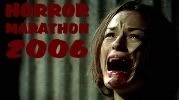United 93 (2006)
 Before addressing the film in question, let me lay rest to the ridiculousness of these “too soon” accusations being lobbied against Paul Greengrass’ United 93. Not only do these sight-unseen naysayers seem to forget that 25th Hour and War of the Worlds ever happened, but the underlying assumption that films exist solely for entertainment purposes is outright condescending to the healing power of art. One only need look briefly at history to see how film, music, and the visual arts have always been used by society to come to terms with newfound developments and tragedies alike, and to suggest that a film like this comes “too soon” is to say that a culture should wait to rebuild after such a paralyzing experience. Whether for better or for worse, United 93 and any film of its ilk has every fundamental right to exist. Fear no art.
Before addressing the film in question, let me lay rest to the ridiculousness of these “too soon” accusations being lobbied against Paul Greengrass’ United 93. Not only do these sight-unseen naysayers seem to forget that 25th Hour and War of the Worlds ever happened, but the underlying assumption that films exist solely for entertainment purposes is outright condescending to the healing power of art. One only need look briefly at history to see how film, music, and the visual arts have always been used by society to come to terms with newfound developments and tragedies alike, and to suggest that a film like this comes “too soon” is to say that a culture should wait to rebuild after such a paralyzing experience. Whether for better or for worse, United 93 and any film of its ilk has every fundamental right to exist. Fear no art.That being said, United 93 is only a partially successful rumination on the events that came to completely redefine what it meant to be a citizen of the United States (and, to a lesser extent, the global community). By focusing primarily on the events to unfold on Flight 93 – the fourth hijacked airplane that crashed in Pennsylvania before reaching its unknown target (outright named here as the White House) – the film is emotionally draining in a way words cannot describe. Surely, it would take a filmmaker of supreme incompetence to recreate these events in a manner that wasn’t harrowing and viscerally terrifying, especially for audiences who lived through much of the same experience less than half a decade ago. Shot entirely in hand-held cameras and presented as a pseudo-documentary, the films realistic nature has already earned it the label of a snuff film, but there is enough going on under the surface to negate the film’s great potential to be nothing more than hollow exploitation (the mind wanders to Pearl Harbor’s morally atrocious bomb point-of-view shot).
United 93 works best when it restricts itself to the doomed flight: the portrayals of both the hijackers and passengers are almost completely absent of characterization, freeing the film from standard genre conventions and allowing it to focus on the barest elements of humanity in conflict from an objective standpoint. By contextualizing these events via inter-cutting them with the destruction wrought on the World Trade Center, the film conflicts with its better intentions, as taking the focus off the conflict on board only lends the film to bullshit thriller tactics concerning events where there is no doubt as to what happened. Despite that fact, however, the tragedy that finally hits is less illuminating than it is outright pummeling, limited by an initial sense not of everyday routine to be shattered by unexpected horrors, but pre-eminent, unavoidable doom (mawkishly foreshadowed by passengers who seemingly talk about nothing but their kids at home, an unnecessarily lingering shot of the plane being fueled, etc.).
In a less artistically inhibited society, a film like United 93 would/should have been released no more than a year or two after the fact; with a full five years of hindsight, the film reflects the unfortunate fact that we have yet to really understand the fullest ramifications September 11th, 2001 has bourn upon American culture (no thanks to the senseless political mire that has come about after the fact). Despite its drawbacks and limitations, however, United 93 does fulfill enough of its obligations, even if only incidentally. The straight-faced recreation of events extinguishes the false foundations for the racist attitudes to have arisen since the attacks, as the hijackers look no different than their fellow, soon-to-be victimized passengers, whose uprising in an effort to regain control of the plane (and cause of it’s lethal descent) stands as a powerful testament to the power of the average person in the face of unspeakable horror. Perhaps no moment in the film is more telling than a sequence that contrasts both the terrorist hijackers and the hysterical passengers praying to God for strength and comfort. All in the name of religion.





